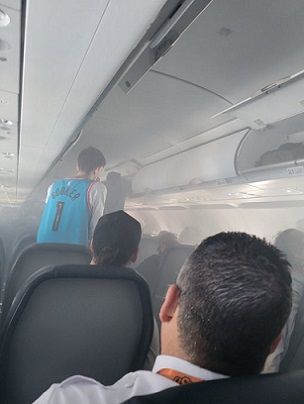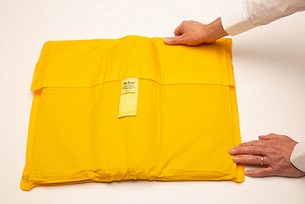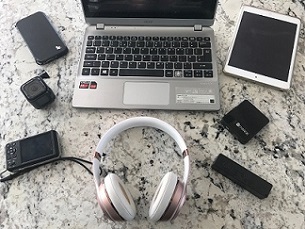 A lithium battery fire can quickly fill an aircraft passenger cabin with thick, acrid smoke
A lithium battery fire can quickly fill an aircraft passenger cabin with thick, acrid smoke
 An AvSax lithium battery fire mitigation bag
An AvSax lithium battery fire mitigation bag
 All these every day electronic devices are powered by lithium ion batteries
All these every day electronic devices are powered by lithium ion batteries
A mobile phone fire on a passenger plane filled the cabin with thick, acrid smoke.
The fire broke out on the JetBlue flight from Los Angeles to Boston on Tuesday, August 20, 2024, as the aircraft was approaching Logan Airport.
WBZ-TV quoted a passenger on the plane, Laura Benson of Brockton, Massachusetts, who said: “I saw really thick, heavy smoke billowing out of the seat area. You smelled the plastic first, like a really harsh smell, and then the cabin just filled up with smoke and you saw the crew go right into action.
“They got the fire extinguisher, made sure everyone was safe and then announced they were putting the air on to get the air cleared up because at that point your eyes started hurting.
“I believe they moved the phone into the bathroom and closed the bathroom doors.”
JetBlue said in a statement: “Crew members addressed the situation consistent with their training. The flight landed safely and no injuries or aircraft damage were reported. JetBlue will work with relevant agencies to complete an investigation of this incident.”
The incident shows that one of the main dangers on board passenger aircraft these days is lithium battery fires because they burn so intensely and can be difficult to put out.
All personal electronic devices - including mobile phones, laptops, iPads, vapes and even earphones – are powered by lithium ion batteries which can go faulty, overheat and catch fire.
When lithium batteries overheat or are damaged they go into thermal runaway and when this happens one cell in a battery overheats it can produce enough heat – up to 900°C (1652°F) – to cause adjacent cells to overheat.
The heat generated by chemical reactions inside the battery causes even more heat, leading to a continuous rise in temperature. This can result in the battery venting and releasing toxic flammable gases, exploding or catching fire and because they burn at such a high temperature, they are very difficult to put out.
There have been 485 verified lithium battery incidents on aircraft recorded by the Federal Aviation Administration in the USA from March 2006 to April 2024 but figures have rocketed in recent years and have been running at an average around one a week since 2017.
These figures are just for the USA which suggests hundreds more incidents have happened elsewhere in the world but have never been reported. No other regulatory authority releases lithium battery incident figures, including the Civil Aviation Authority in the UK.
This potential danger is why more than 100 airline companies worldwide – including some of the biggest names in the industry – carry AvSax lithium battery fire mitigation bags designed in the UK where they won the Queen’s Award for Enterprise for their innovation, the highest accolade any business can get.
AvSax, devised by Environmental Defence Systems Ltd based in Huddersfield, Yorkshire, England, are now on board around 16,750 aircraft globally and have been deployed in action dozens of times.
To find out how they work and for more information go to www.avsax.com